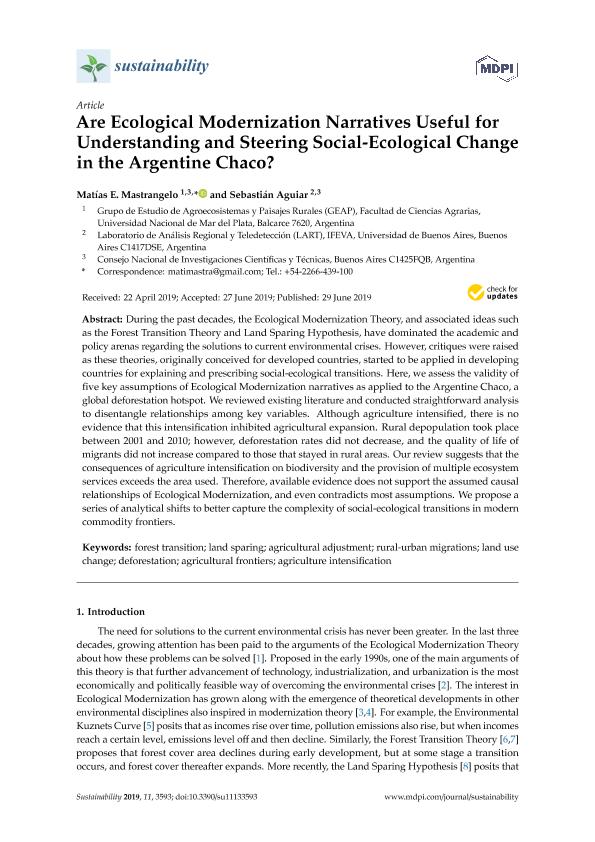Artículo
Are Ecological Modernization Narratives Useful for Understanding and Steering Social-Ecological Change in the Argentine Chaco?
Fecha de publicación:
06/2019
Editorial:
MDPI
Revista:
Sustainability
ISSN:
2071-1050
Idioma:
Inglés
Tipo de recurso:
Artículo publicado
Clasificación temática:
Resumen
During the past decades, the Ecological Modernization Theory, and associated ideas such as the Forest Transition Theory and Land Sparing Hypothesis, have dominated the academic and policy arenas regarding the solutions to current environmental crises. However, critiques were raised as these theories, originally conceived for developed countries, started to be applied in developing countries for explaining and prescribing social-ecological transitions. Here, we assess the validity of five key assumptions of Ecological Modernization narratives as applied to the Argentine Chaco, a global deforestation hotspot. We reviewed existing literature and conducted straightforward analysis to disentangle relationships among key variables. Although agriculture intensified, there is no evidence that this intensification inhibited agricultural expansion. Rural depopulation took place between 2001 and 2010; however, deforestation rates did not decrease, and the quality of life of migrants did not increase compared to those that stayed in rural areas. Our review suggests that the consequences of agriculture intensification on biodiversity and the provision of multiple ecosystem services exceeds the area used. Therefore, available evidence does not support the assumed causal relationships of Ecological Modernization, and even contradicts most assumptions. We propose a series of analytical shifts to better capture the complexity of social-ecological transitions in modern commodity frontiers.
Archivos asociados
Licencia
Identificadores
Colecciones
Articulos(CCT - MAR DEL PLATA)
Articulos de CTRO.CIENTIFICO TECNOL.CONICET - MAR DEL PLATA
Articulos de CTRO.CIENTIFICO TECNOL.CONICET - MAR DEL PLATA
Articulos(IFEVA)
Articulos de INST.D/INV.FISIOLOGICAS Y ECO.VINCULADAS A L/AGRIC
Articulos de INST.D/INV.FISIOLOGICAS Y ECO.VINCULADAS A L/AGRIC
Citación
Mastrangelo, Matias Enrique; Aguiar, Sebastián; Are Ecological Modernization Narratives Useful for Understanding and Steering Social-Ecological Change in the Argentine Chaco?; MDPI; Sustainability; 11; 13; 6-2019; 1-20
Compartir
Altmétricas




